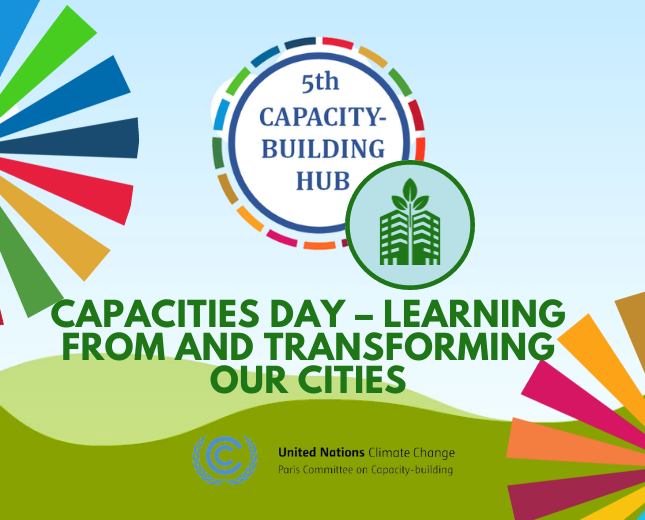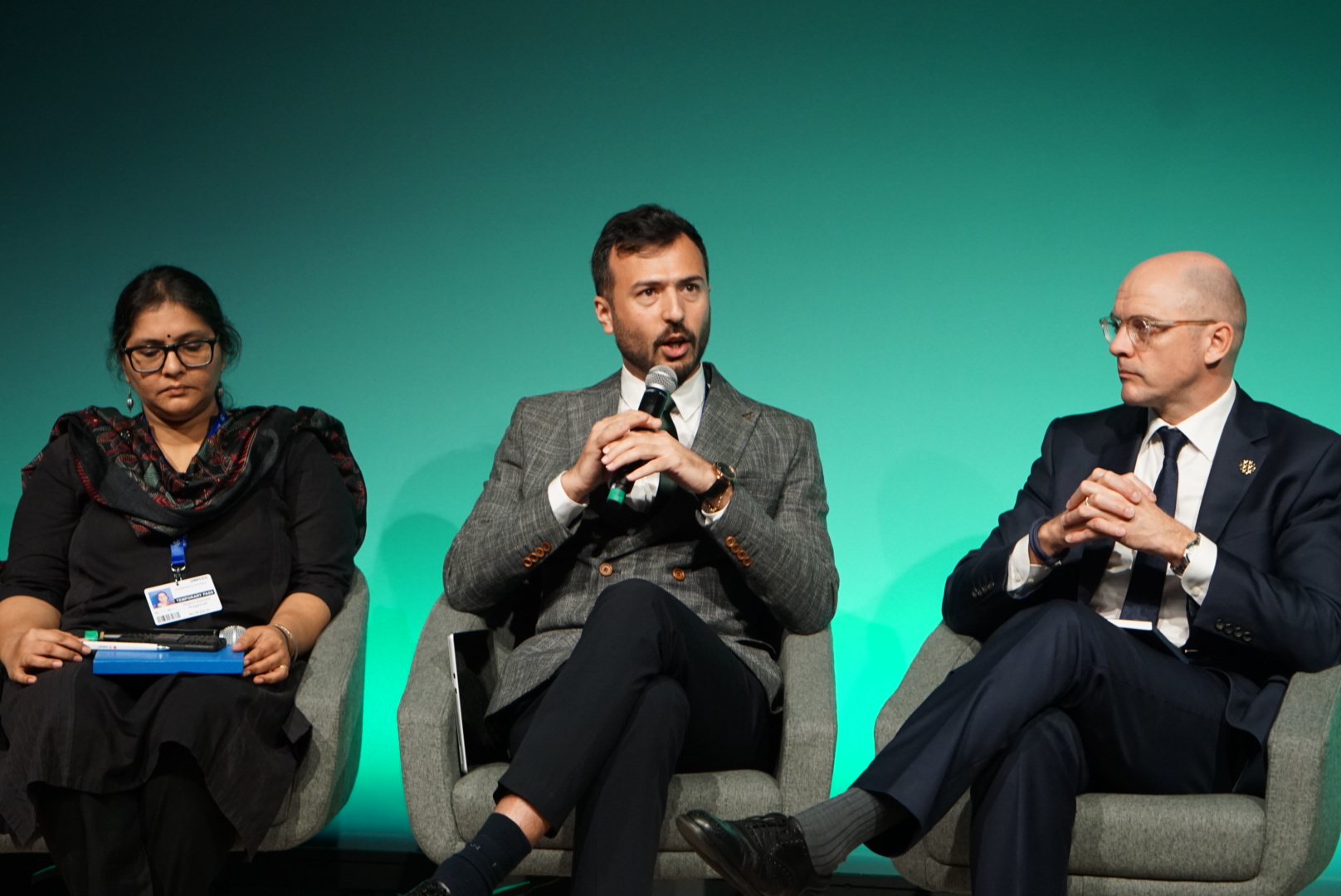Credit: UNU-EHS
Recording
Organizers
The session was organized by United Nations University's Institute for Environment and Human Security (UNU-EHS) and ICLEI- Local Government for Sustainability
Background
The first session of the day was co-organized by the United Nations University (UNU) and ICLEI – Local Governments for Sustainability. UNU is the academic arm of the United Nations and acts as a global think tank. The mission of the Institute for Environment and Human Security (UNU-EHS) is to carry out cutting-edge research on risk, adaptation, and transformation related to environmental hazards and global change. One core pillar is work on urban transformation toward sustainability to inform and enhance policy. ICLEI is a global network of more than 2500 local and regional governments committed to sustainable urban development. Under the Global Research Strategy, ICLEI acts at the research-policy interface to bring together policymakers with leading-edge, policy-relevant research. UNU-EHS and ICLEI share a common vision and goal of advancing sustainability, resilience and inclusiveness in cities and regions.
The opening session set the scene for CapaCITIES Day, which delved into capacity-building efforts, encouraging dynamic and solution-driven bottom-up approaches to address the climate emergency. The session consisted of two dialogues that was linked by the moderators. The first, hosted by UNU-EHS, focused on empowering transformative urban action for and by communities. The panel explored how to move towards demand-based and bottom-up approaches that involve and empower local communities in co-creating and co-delivering solutions for climate action. The esteemed speakers shared experiences and best practices of community-led initiatives and innovations from diverse contexts and regions to explore what capacities are required in order to harness the potential of diversity and inclusive collaboration as a catalyst for change.
The second dialogue, hosted by ICLEI, focused on an Expanded Climate and Innovation Agenda (ECIA) centered on human needs. The panel dived into the core principles and tools of the ECIA, which aimed to overcome the limitations of existing static approaches to addressing the climate emergency that focus on optimizing and reinforcing existing practices towards instead leveraging the opportunities of emerging technologies and new approaches to generate agenda-setting and transformative innovation. The dialogue discussed what capacities cities need to expand their existing climate strategies and become active solution providers contributing towards global sustainability and delivering flourishing lives for 11 billion people.
In combination, the session brought together diverse perspectives to inspire the bolder and more transformative action needed to fulfill the needs of current and future populations without exceeding planetary boundaries.
Objectives
- Setting the scene for CapaCITIES Day
- Fostering Community Empowerment and Inclusivity in Urban Development
- Integrating Cutting-Edge Research with Practical Policy Implementation
- Inspiring with Good Practices from Different Countries and Communities
- Advancing a Human-Centric Approach to Expand Climate and Innovation Agendas
- Building Capacities to Become Local and Global Solution Providers
- Promoting Collaborative Efforts for Transformative Change
Structure
|
Time
|
Activity
|
Speaker(s)
|
|
8:30
|
Opening Remark by PCCB
|
|
|
8:35
|
Welcome note by ICLEI
|
- Cathy Oke, ICLEI Global Executive Committee
|
|
8:38
|
Welcome note by UNU-EHS
|
- Xiaomeng Shen, Director, UNU-EHS
|
|
8:40
|
Launch of the photo exhibition
|
- Laura Arevalos, community referent and member of Urban Lab in Villa 20, Buenos Aires
- Arianna Flores Corral, Communication Analyst, UNU-EHS
|
|
8:50
|
Dialogue (I): Empowering transformative urban action for and by communities
|
- Delfina Matarazzo, General Director of Housing Development, Housing Institute of the City of Buenos Aires, Argentina
- Roshni Kishore Nuggehalli, Executive Director, Youth for Unity and Voluntary Action (YUVA), India
- Pourya Salehi, Head of Urban Research, Innovation, and Development Department, ICLEI World Secretariat
- Rogier Vandenberg, Global Director WRI Ross Center for Sustainable Cities (tbc)
- Andrea Ramírez, senior researcher & lead of capacity-building component in TUC project, UNU-EHS
|
|
9:35
|
Dialogue (II): An Expanded Climate & Innovation Agenda with Focus on Human Needs
|
- Alejandro Kilpatrick, Manager, Capacity-building sub-division, UNFCCC
- Dennis Pamlin, Executive Director, Net-Zero Compatibility Initiative, Mission Innovation
- Petra Dzurovčinová, Chief Innovation Officer - Bratislava
- A local leader from ICLEI network from Global South (tbc)
- Simone Sandholz, Head of Urban Futures & Sustainability Transformation Division, UNU-EHS
|
|
`10:25
|
Key takeaways
|
- Simone Sandholz, Head of Urban Futures & Sustainability Transformation Division, UNU-EHS
- Pourya Salehi, Head of Urban Research, Innovation, and Development Department, ICLEI World Secretariat
|
Moderators
Pourya Salehi, ICLEI
Simone Sandholz, UNU-EHS
Key Outcomes
- Capacity-building can empower transformative urban action, that goes beyond technical skills but includes among others narration and communication skills, particular when it comes to empowering vulnerable communities to tell their own stories.
- To expand the climate and innovation agenda, the understanding of urban needs calls for different approaches, which overall must benefit people and facilitate their learning.
- Capacity development is a process that starts with needs and requires meaningful engagement to deliver impactful results that help people, their communities, and the cities they live in.
Resources
Accelerating Innovation and Climate Strategies for the 21st Century: Delivering on Human Needs



